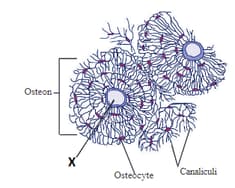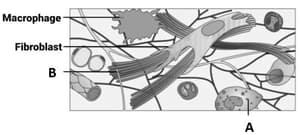Animal Tissues
Animal Tissues: Overview
This topic covers concepts, such as, Animal Tissues, Epithelial Tissues, Chondrocyte & Muscle Fiber etc.
Important Questions on Animal Tissues
There are various types of tissues. A is one of them, which is involved in producing force and generating motion, either for locomotion or for other body movements within internal organs. There are three types of tissue A:
X: they are typically attached to bones.
Y: found in the heart.
Z: they are found in the inner walls of organs.
Tissue A is associated with different movements including walking, running, lifting, chewing, picking and dropping objects, etc. There are other major functions of tissue A in the body like maintaining an erect position, or posture and controls respiration by automatically driving the movement of air both into and out of the body.
Identify the type of tissue 'Y' and 'Z'.
There are various types of tissues. A is one of them, which is involved in producing force and generating motion, either for locomotion or for other body movements within internal organs. There are three types of tissue A:
X: they are typically attached to bones.
Y: found in the heart.
Z: they are found in the inner walls of organs.
Tissues A are associated with different movements including walking, running, lifting, chewing, picking and dropping objects, etc. There are other major functions of A tissue in the body like maintaining an erect position, or posture and controls respiration by automatically driving the movement of air both into and out of the body.
Identify the type of tissue 'X'.
There are various types of tissues. A is one of them, which is involved in producing force and generating motion, either for locomotion or for other body movements within internal organs. There are three types of tissue A:
X: they are typically attached to bones.
Y: found in the heart.
Z: they are found in the inner walls of organs.
Tissues A are associated with different movements including walking, running, lifting, chewing, picking and dropping objects, etc. There are other major functions of A tissue in the body like maintaining an erect position, or posture and controls respiration by automatically driving the movement of air both into and out of the body.
Identify the type of tissue A.
The given diagram shows the bone cells.

Identify the part labelled as 'X'.
Macrophages synthesise and secrete collagen proteins.
Fill in the blank with the correct option provided in the bracket.
A type of cell called _____(fibroblast/adipocyte/macrophage) in the connective tissue helps in the elimination of antigens by engulfing them.
Fibroblasts are immune cells of the connective tissue.
Name the cell in connective tissue that synthesises the extracellular matrix and collagen.
Given in options are cells of connective tissue and functions (Functions might be right or wrong. Identify the correct pairing.
Monocytes belong to the _____ category of leucocytes.
The mast cells produce histamine that combats inflammatory reactions.
From the given diagram of the areolar tissue, identify the correct labelling of A and B.
Which of the following is not the function of mast cells?
Fill in the blank with the correct answer from the bracket.
_____ are the bone cells which are embedded in a hard matrix. (Chondrocytes, Osteocytes, Lymphocytes)

